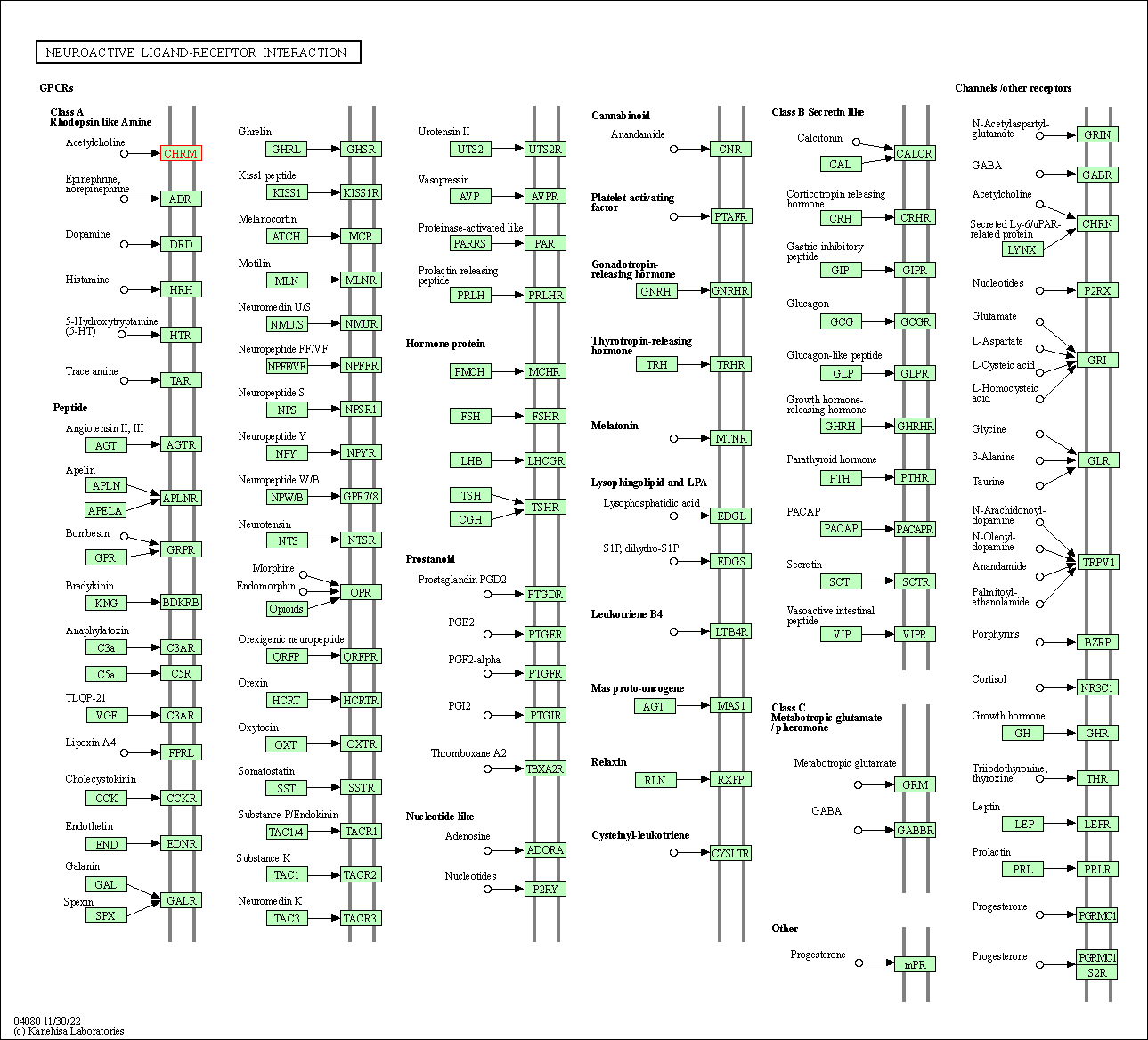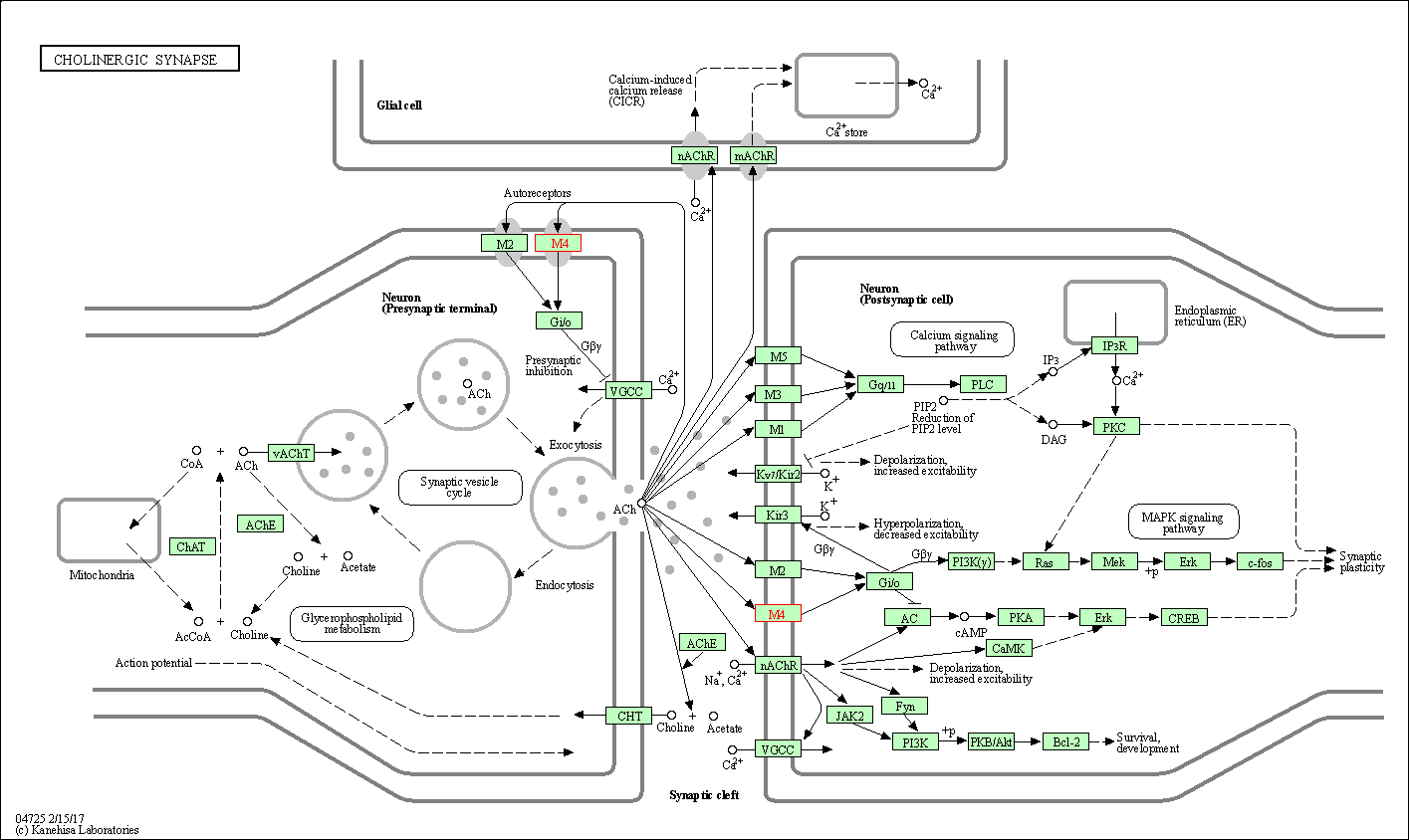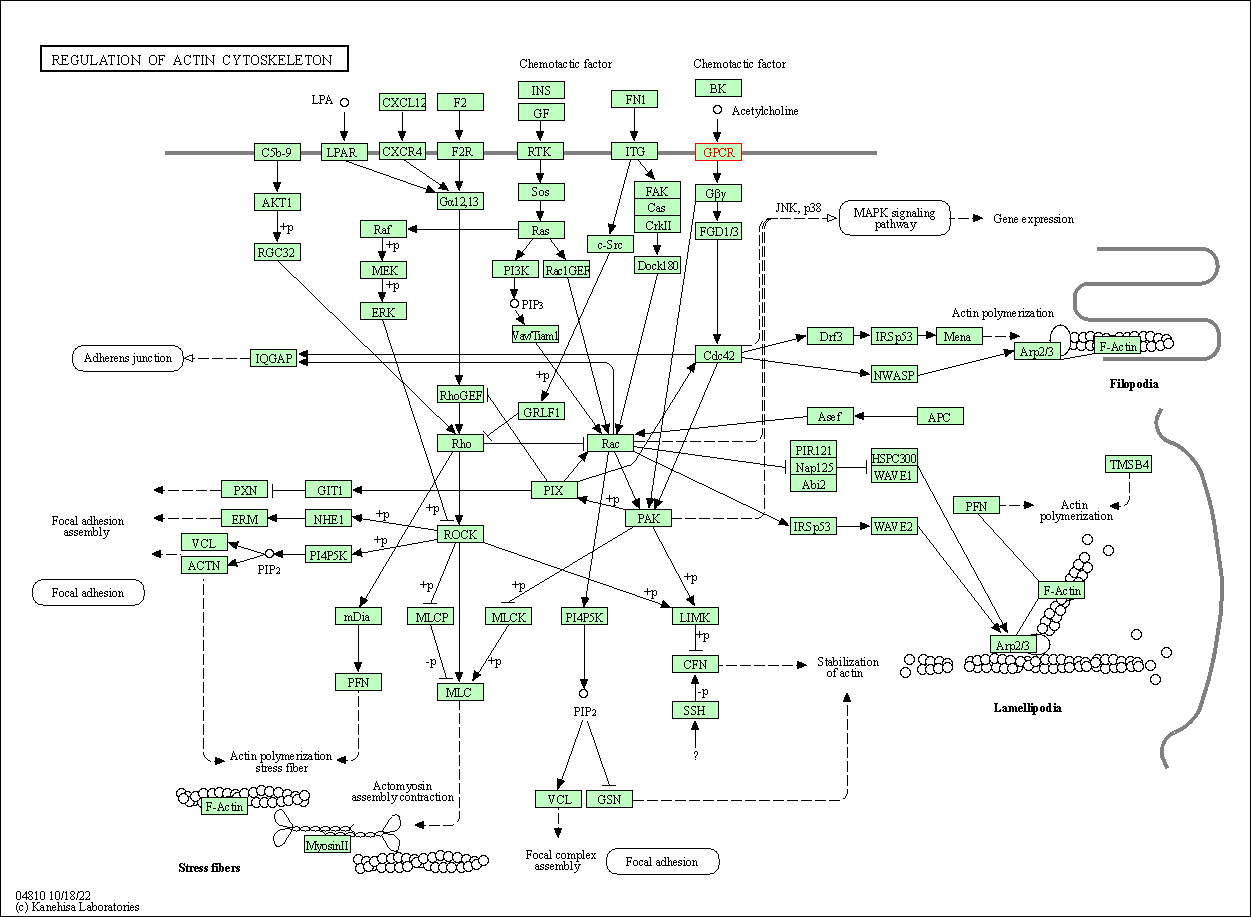Target Information
| Target General Information | Top | |||||
|---|---|---|---|---|---|---|
| Target ID |
T20709
(Former ID: TTDS00005)
|
|||||
| Target Name |
Muscarinic acetylcholine receptor M4 (CHRM4)
|
|||||
| Synonyms |
M4 receptor; CHRM4
Click to Show/Hide
|
|||||
| Gene Name |
CHRM4
|
|||||
| Target Type |
Successful target
|
[1] | ||||
| Disease | [+] 5 Target-related Diseases | + | ||||
| 1 | Asthma [ICD-11: CA23] | |||||
| 2 | Eye anterior segment structural developmental anomaly [ICD-11: LA11] | |||||
| 3 | Glaucoma [ICD-11: 9C61] | |||||
| 4 | Nausea/vomiting [ICD-11: MD90] | |||||
| 5 | Respiratory system disease [ICD-11: CB40-CB7Z] | |||||
| Function |
The muscarinic acetylcholine receptor mediates various cellular responses, including inhibition of adenylate cyclase, breakdown of phosphoinositides and modulation of potassium channels through the action of G proteins. Primary transducing effect is inhibition of adenylate cyclase.
Click to Show/Hide
|
|||||
| BioChemical Class |
GPCR rhodopsin
|
|||||
| UniProt ID | ||||||
| Sequence |
MANFTPVNGSSGNQSVRLVTSSSHNRYETVEMVFIATVTGSLSLVTVVGNILVMLSIKVN
RQLQTVNNYFLFSLACADLIIGAFSMNLYTVYIIKGYWPLGAVVCDLWLALDYVVSNASV MNLLIISFDRYFCVTKPLTYPARRTTKMAGLMIAAAWVLSFVLWAPAILFWQFVVGKRTV PDNQCFIQFLSNPAVTFGTAIAAFYLPVVIMTVLYIHISLASRSRVHKHRPEGPKEKKAK TLAFLKSPLMKQSVKKPPPGEAAREELRNGKLEEAPPPALPPPPRPVADKDTSNESSSGS ATQNTKERPATELSTTEATTPAMPAPPLQPRALNPASRWSKIQIVTKQTGNECVTAIEIV PATPAGMRPAANVARKFASIARNQVRKKRQMAARERKVTRTIFAILLAFILTWTPYNVMV LVNTFCQSCIPDTVWSIGYWLCYVNSTINPACYALCNATFKKTFRHLLLCQYRNIGTAR Click to Show/Hide
|
|||||
| 3D Structure | Click to Show 3D Structure of This Target | AlphaFold | ||||
| HIT2.0 ID | T95T22 | |||||
| Drugs and Modes of Action | Top | |||||
|---|---|---|---|---|---|---|
| Approved Drug(s) | [+] 3 Approved Drugs | + | ||||
| 1 | ACECLIDINE | Drug Info | Approved | Glaucoma/ocular hypertension | [5], [4] | |
| 2 | Methacholine Chloride | Drug Info | Approved | bronchial hyperreactivity | [4] | |
| 3 | Tropicamide | Drug Info | Approved | Mydriasis | [6], [7] | |
| Mode of Action | [+] 4 Modes of Action | + | ||||
| Inhibitor | [+] 30 Inhibitor drugs | + | ||||
| 1 | ACECLIDINE | Drug Info | [8] | |||
| 2 | Methacholine Chloride | Drug Info | [9] | |||
| 3 | 1'-Benzyl-3-phenyl-[3,4']bipiperidinyl-2,6-dione | Drug Info | [11] | |||
| 4 | 1-Methyl-1-(4-pyrrolidin-1-yl-but-2-ynyl)-urea | Drug Info | [12] | |||
| 5 | 2,8-Dimethyl-1-oxa-8-aza-spiro[4.5]decan-3-one | Drug Info | [13] | |||
| 6 | 3-(3-benzylamino)-piperidin-2-one | Drug Info | [14] | |||
| 7 | 3-Methyl-7-pyrrolidin-1-yl-hept-5-yn-2-one | Drug Info | [15] | |||
| 8 | 3-Tetrazol-2-yl-1-aza-bicyclo[2.2.2]octane | Drug Info | [16] | |||
| 9 | 4-(4-butylpiperidin-1-yl)-1-o-tolylbutan-1-one | Drug Info | [17] | |||
| 10 | 6-Dimethylamino-2-methyl-hex-4-ynal oxime | Drug Info | [15] | |||
| 11 | 7-Dimethylamino-3-methyl-hept-5-yn-2-one | Drug Info | [15] | |||
| 12 | 7-Dimethylamino-hept-5-yn-2-one | Drug Info | [15] | |||
| 13 | 7-Pyrrolidin-1-yl-hept-5-yn-2-one | Drug Info | [15] | |||
| 14 | A-987306 | Drug Info | [18] | |||
| 15 | Acetic acid 8-aza-bicyclo[3.2.1]oct-6-yl ester | Drug Info | [9] | |||
| 16 | Benzoic acid 8-aza-bicyclo[3.2.1]oct-6-yl ester | Drug Info | [21] | |||
| 17 | BRL-55473 | Drug Info | [22] | |||
| 18 | FLUMEZAPINE | Drug Info | [24] | |||
| 19 | FM1-10 | Drug Info | [25] | |||
| 20 | FM1-43 | Drug Info | [25] | |||
| 21 | GNF-PF-5618 | Drug Info | [26] | |||
| 22 | ISOCLOZAPINE | Drug Info | [27] | |||
| 23 | ISOLOXAPINE | Drug Info | [28] | |||
| 24 | N-(4-Dimethylamino-but-2-ynyl)-N-methyl-acetamide | Drug Info | [15] | |||
| 25 | N-methoxyquinuclidine-3-carboximidoyl chloride | Drug Info | [22] | |||
| 26 | PF-3409409 | Drug Info | [29] | |||
| 27 | Propionic acid 8-aza-bicyclo[3.2.1]oct-6-yl ester | Drug Info | [21] | |||
| 28 | SULFOARECOLINE | Drug Info | [31] | |||
| 29 | VU10007 | Drug Info | [32] | |||
| 30 | VU10010 | Drug Info | [32] | |||
| Antagonist | [+] 1 Antagonist drugs | + | ||||
| 1 | Tropicamide | Drug Info | [1], [10] | |||
| Modulator | [+] 1 Modulator drugs | + | ||||
| 1 | AF-DX-384 | Drug Info | [19], [20] | |||
| Agonist | [+] 3 Agonist drugs | + | ||||
| 1 | CMI-1145 | Drug Info | [23] | |||
| 2 | CMI-936 | Drug Info | [23] | |||
| 3 | PTAC | Drug Info | [30] | |||
| Cell-based Target Expression Variations | Top | |||||
|---|---|---|---|---|---|---|
| Cell-based Target Expression Variations | ||||||
| Drug Binding Sites of Target | Top | |||||
|---|---|---|---|---|---|---|
| Ligand Name: Tiotropium | Ligand Info | |||||
| Structure Description | Structure of the M4 muscarinic acetylcholine receptor (M4-mT4L) bound to tiotropium | PDB:5DSG | ||||
| Method | X-ray diffraction | Resolution | 2.60 Å | Mutation | Yes | [33] |
| PDB Sequence |
GPSSHNRYET
29 VEMVFIATVT39 GSLSLVTVVG49 NILVMLSIKV59 NRQLQTVNNY69 FLFSLACADL 79 IIGAFSMNLY89 TVYIIKGYWP99 LGAVVCDLWL109 ALDYVVSNAS119 VMNLLIISFD 129 RYFCVTKPLT139 YPARRTTKMA149 GLMIAAAWVL159 SFVLWAPAIL169 FWQFVVGKRT 179 VPDNQCFIQF189 LSNPAVTFGT199 AIAAFYLPVV209 IMTVLYIHIS219 LASRSRVNIF 1004 EMLRIDEEAE1021 KLFNQDVDAA1031 VRGILRNAKL1041 KPVYDSLDAV1051 RRAALINMVF 1061 QMGETGVAGF1071 TNSLRMLQQK1081 RWDEAAVNLA1091 KSRWYNQTPN1101 RAKRVITTFR 1111 TGTWDAYRKV398 TRTIFAILLA408 FILTWTPYNV418 MVLVNTFCQS428 CIPDTVWSIG 438 YWLCYVNSTI448 NPACYALCNA458 TFKKTFRHLL468 LC
|
|||||
|
|
||||||
| Ligand Name: Adenosine | Ligand Info | |||||
| Structure Description | Cryo-EM structure of the human adenosine A1 receptor-Gi2-protein complex bound to its endogenous agonist and an allosteric ligand | PDB:7LD3 | ||||
| Method | Electron microscopy | Resolution | 3.20 Å | Mutation | No | [34] |
| PDB Sequence |
SISAFQAAYI
13 GIEVLIALVS23 VPGNVLVIWA33 VKVNQALRDA43 TFCFIVSLAV53 ADVAVGALVI 63 PLAILINIGP73 QTYFHTCLMV83 ACPVLILTQS93 SILALLAIAV103 DRYLRVKIPL 113 RYKMVVTPRR123 AAVAIAGCWI133 LSFVVGLTPM143 FGWNNLSAVE153 RAWAANGSMG 163 EPVIKCEFEK173 VISMEYMVYF183 NFFVWVLPPL193 LLMVLIYLEV203 FYLIRKQLNK 213 KYYGKELKIA233 KSLALILFLF243 ALSWLPLHIL253 NCITLFCPSC263 HKPSILTYIA 273 IFLTHGNSAM283 NPIVYAFRIQ293 KFRVTFLK
|
|||||
|
|
||||||
| Click to View More Binding Site Information of This Target and Ligand Pair | ||||||
| Click to View More Binding Site Information of This Target with Different Ligands | ||||||
| Different Human System Profiles of Target | Top |
|---|---|
|
Human Similarity Proteins
of target is determined by comparing the sequence similarity of all human proteins with the target based on BLAST. The similarity proteins for a target are defined as the proteins with E-value < 0.005 and outside the protein families of the target.
A target that has fewer human similarity proteins outside its family is commonly regarded to possess a greater capacity to avoid undesired interactions and thus increase the possibility of finding successful drugs
(Brief Bioinform, 21: 649-662, 2020).
Human Pathway Affiliation
of target is determined by the life-essential pathways provided on KEGG database. The target-affiliated pathways were defined based on the following two criteria (a) the pathways of the studied target should be life-essential for both healthy individuals and patients, and (b) the studied target should occupy an upstream position in the pathways and therefore had the ability to regulate biological function.
Targets involved in a fewer pathways have greater likelihood to be successfully developed, while those associated with more human pathways increase the chance of undesirable interferences with other human processes
(Pharmacol Rev, 58: 259-279, 2006).
Human Similarity Proteins
Human Pathway Affiliation
|
|
| KEGG Pathway | Pathway ID | Affiliated Target | Pathway Map |
|---|---|---|---|
| Neuroactive ligand-receptor interaction | hsa04080 | Affiliated Target |

|
| Class: Environmental Information Processing => Signaling molecules and interaction | Pathway Hierarchy | ||
| Cholinergic synapse | hsa04725 | Affiliated Target |

|
| Class: Organismal Systems => Nervous system | Pathway Hierarchy | ||
| Regulation of actin cytoskeleton | hsa04810 | Affiliated Target |

|
| Class: Cellular Processes => Cell motility | Pathway Hierarchy | ||
| Chemical Structure based Activity Landscape of Target | Top |
|---|---|
| Drug Property Profile of Target | Top | |
|---|---|---|
| (1) Molecular Weight (mw) based Drug Clustering | (2) Octanol/Water Partition Coefficient (xlogp) based Drug Clustering | |
|
|
||
| (3) Hydrogen Bond Donor Count (hbonddonor) based Drug Clustering | (4) Hydrogen Bond Acceptor Count (hbondacc) based Drug Clustering | |
|
|
||
| (5) Rotatable Bond Count (rotbonds) based Drug Clustering | (6) Topological Polar Surface Area (polararea) based Drug Clustering | |
|
|
||
| "RO5" indicates the cutoff set by lipinski's rule of five; "D123AB" colored in GREEN denotes the no violation of any cutoff in lipinski's rule of five; "D123AB" colored in PURPLE refers to the violation of only one cutoff in lipinski's rule of five; "D123AB" colored in BLACK represents the violation of more than one cutoffs in lipinski's rule of five | ||
| Co-Targets | Top | |||||
|---|---|---|---|---|---|---|
| Co-Targets | ||||||
| Target Poor or Non Binders | Top | |||||
|---|---|---|---|---|---|---|
| Target Poor or Non Binders | ||||||
| Target Profiles in Patients | Top | |||||
|---|---|---|---|---|---|---|
| Target Expression Profile (TEP) | ||||||
| Target Affiliated Biological Pathways | Top | |||||
|---|---|---|---|---|---|---|
| KEGG Pathway | [+] 3 KEGG Pathways | + | ||||
| 1 | Neuroactive ligand-receptor interaction | |||||
| 2 | Cholinergic synapse | |||||
| 3 | Regulation of actin cytoskeleton | |||||
| Panther Pathway | [+] 4 Panther Pathways | + | ||||
| 1 | Alzheimer disease-amyloid secretase pathway | |||||
| 2 | Heterotrimeric G-protein signaling pathway-Gi alpha and Gs alpha mediated pathway | |||||
| 3 | Heterotrimeric G-protein signaling pathway-Gq alpha and Go alpha mediated pathway | |||||
| 4 | Muscarinic acetylcholine receptor 2 and 4 signaling pathway | |||||
| Reactome | [+] 2 Reactome Pathways | + | ||||
| 1 | Muscarinic acetylcholine receptors | |||||
| 2 | G alpha (i) signalling events | |||||
| WikiPathways | [+] 6 WikiPathways | + | ||||
| 1 | Monoamine GPCRs | |||||
| 2 | Calcium Regulation in the Cardiac Cell | |||||
| 3 | Regulation of Actin Cytoskeleton | |||||
| 4 | GPCRs, Class A Rhodopsin-like | |||||
| 5 | GPCR ligand binding | |||||
| 6 | GPCR downstream signaling | |||||
| Target-Related Models and Studies | Top | |||||
|---|---|---|---|---|---|---|
| Target Validation | ||||||
| References | Top | |||||
|---|---|---|---|---|---|---|
| REF 1 | The muscarinic receptor antagonist tropicamide suppresses tremulous jaw movements in a rodent model of parkinsonian tremor: possible role of M4 rec... Psychopharmacology (Berl). 2007 Oct;194(3):347-59. | |||||
| REF 2 | URL: http://www.guidetopharmacology.org Nucleic Acids Res. 2015 Oct 12. pii: gkv1037. The IUPHAR/BPS Guide to PHARMACOLOGY in 2016: towards curated quantitative interactions between 1300 protein targets and 6000 ligands. (Ligand id: 7163). | |||||
| REF 3 | FDA Approved Drug Products from FDA Official Website. 2009. Application Number: (NDA) 016033. | |||||
| REF 4 | Drugs@FDA. U.S. Food and Drug Administration. U.S. Department of Health & Human Services. 2015 | |||||
| REF 5 | URL: http://www.guidetopharmacology.org Nucleic Acids Res. 2015 Oct 12. pii: gkv1037. The IUPHAR/BPS Guide to PHARMACOLOGY in 2016: towards curated quantitative interactions between 1300 protein targets and 6000 ligands. (Ligand id: 288). | |||||
| REF 6 | URL: http://www.guidetopharmacology.org Nucleic Acids Res. 2015 Oct 12. pii: gkv1037. The IUPHAR/BPS Guide to PHARMACOLOGY in 2016: towards curated quantitative interactions between 1300 protein targets and 6000 ligands. (Ligand id: 7319). | |||||
| REF 7 | FDA Approved Drug Products from FDA Official Website. 2009. Application Number: (ANDA) 040064. | |||||
| REF 8 | Design, synthesis, and neurochemical evaluation of 5-(3-alkyl-1,2,4- oxadiazol-5-yl)-1,4,5,6-tetrahydropyrimidines as M1 muscarinic receptor agonists. J Med Chem. 1993 Apr 2;36(7):842-7. | |||||
| REF 9 | 6beta-Acetoxynortropane: a potent muscarinic agonist with apparent selectivity toward M2-receptors. J Med Chem. 1998 Jun 4;41(12):2047-55. | |||||
| REF 10 | Zebrafish M2 muscarinic acetylcholine receptor: cloning, pharmacological characterization, expression patterns and roles in embryonic bradycardia. Br J Pharmacol. 2002 Nov;137(6):782-92. | |||||
| REF 11 | Synthesis and biological evaluation of [125I]- and [123I]-4-iododexetimide, a potent muscarinic cholinergic receptor antagonist. J Med Chem. 1989 May;32(5):1057-62. | |||||
| REF 12 | Urea and 2-imidazolidone derivatives of the muscarinic agents oxotremorine and N-methyl-N-(1-methyl-4-pyrrolidino-2-butynyl)acetamide. J Med Chem. 1992 Aug 21;35(17):3270-9. | |||||
| REF 13 | Synthesis and modeling studies of a potent conformationally rigid muscarinic agonist: 1-azabicyclo[2.2.1]heptanespirofuranone. J Med Chem. 1998 Oct 22;41(22):4181-5. | |||||
| REF 14 | Designing active template molecules by combining computational de novo design and human chemist's expertise. J Med Chem. 2007 Apr 19;50(8):1925-32. | |||||
| REF 15 | Cholinergic agents: aldehyde, ketone, and oxime analogues of the muscarinic agonist UH5, Bioorg. Med. Chem. Lett. 2(8):803-808 (1992). | |||||
| REF 16 | Synthesis and muscarinic activities of quinuclidin-3-yltriazole and -tetrazole derivatives. J Med Chem. 1992 Apr 3;35(7):1280-90. | |||||
| REF 17 | Discovery of N-{1-[3-(3-oxo-2,3-dihydrobenzo[1,4]oxazin-4-yl)propyl]piperidin-4-yl}-2-phenylacetamide (Lu AE51090): an allosteric muscarinic M1 rec... J Med Chem. 2010 Sep 9;53(17):6386-97. | |||||
| REF 18 | cis-4-(Piperazin-1-yl)-5,6,7a,8,9,10,11,11a-octahydrobenzofuro[2,3-h]quinazolin-2-amine (A-987306), a new histamine H4R antagonist that blocks pain... J Med Chem. 2008 Nov 27;51(22):7094-8. | |||||
| REF 19 | M2/M4 muscarinic receptor binding in the anterior cingulate cortex in schizophrenia and mood disorders. Brain Res Bull. 2005 May 15;65(5):397-403. | |||||
| REF 20 | M2 receptor binding of the selective antagonist AF-DX 384: possible involvement of the common allosteric site. Mol Pharmacol. 1998 Feb;53(2):304-12. | |||||
| REF 21 | 6beta-Acyloxy(nor)tropanes: affinities for antagonist/agonist binding sites on transfected and native muscarinic receptors. J Med Chem. 2000 Jun 29;43(13):2514-22. | |||||
| REF 22 | A novel and selective class of azabicyclic muscarinic agonists incorporating an N-methoxy imidoyl halide or nitrile functionality, Bioorg. Med. Chem. Lett. 2(8):791-796 (1992). | |||||
| REF 23 | Evaluation of muscarinic agonist-induced analgesia in muscarinic acetylcholine receptor knockout mice. Mol Pharmacol. 2002 Nov;62(5):1084-93. | |||||
| REF 24 | Synthesis and pharmacological evaluation of a series of 4-piperazinylpyrazolo[3,4-b]- and -[4,3-b][1,5]benzodiazepines as potential anxiolytics. J Med Chem. 1989 Dec;32(12):2573-82. | |||||
| REF 25 | Design and synthesis of a fluorescent muscarinic antagonist. Bioorg Med Chem Lett. 2008 Jan 15;18(2):825-7. | |||||
| REF 26 | Nocardimicins A, B, C, D, E, and F, siderophores with muscarinic M3 receptor inhibiting activity from Nocardia sp. TP-A0674. J Nat Prod. 2005 Jul;68(7):1061-5. | |||||
| REF 27 | Chloro-substituted, sterically hindered 5,11-dicarbo analogues of clozapine as potential chiral antipsychotic agents. J Med Chem. 1990 Feb;33(2):809-14. | |||||
| REF 28 | Synthesis of clozapine analogues and their affinity for clozapine and spiroperidol binding sites in rat brain. J Med Chem. 1981 Sep;24(9):1021-6. | |||||
| REF 29 | Design, synthesis and evaluation of N-[(3S)-pyrrolidin-3-yl]benzamides as selective noradrenaline reuptake inhibitors: CNS penetration in a more po... Bioorg Med Chem Lett. 2009 Aug 15;19(16):4579-83. | |||||
| REF 30 | Function of pulmonary neuronal M(2) muscarinic receptors in stable chronic obstructive pulmonary disease. Am J Respir Crit Care Med. 2001 May;163(6):1320-5. | |||||
| REF 31 | Heterocyclic muscarinic agonists. Synthesis and biological activity of some bicyclic sulfonium arecoline bioisosteres. J Med Chem. 1988 Jul;31(7):1312-6. | |||||
| REF 32 | An allosteric potentiator of M4 mAChR modulates hippocampal synaptic transmission. Nat Chem Biol. 2008 Jan;4(1):42-50. | |||||
| REF 33 | Crystal structures of the M1 and M4 muscarinic acetylcholine receptors. Nature. 2016 Mar 17;531(7594):335-40. | |||||
| REF 34 | Positive allosteric mechanisms of adenosine A(1) receptor-mediated analgesia. Nature. 2021 Sep;597(7877):571-576. | |||||
If You Find Any Error in Data or Bug in Web Service, Please Kindly Report It to Dr. Zhou and Dr. Zhang.

